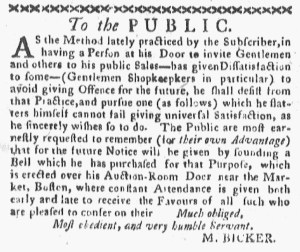What was advertised in a colonial American newspaper 250 years ago today?

“A Bell … which is erected over his Auction-Room Door.”
Martin Bicker’s neighbors were not happy with him. As the auctioneer explained in an advertisement addressed “To thePUBLIC” in the Boston-Gazette in the spring of 1774, some of them objected to one of the methods he deployed to get bidders into his “Auction-Room.” Bicker had hired someone to stand “at his Door to invite Gentlemen and others to his public Sales.” In other words, he stationed an employee at the entrance to engage passersby in hopes of convincing them to check out the items going up for bid. That innovation supplemented other marketing efforts undertaken by auctioneers, including newspaper notices, catalogs, handbills, and previews of goods in advance of auctions.
Other colonizers in the vicinity of Bicker’s auction house apparently did not care for this innovation. He reported that it “has given Dissatisfaction to some” and singled out “Gentlemen Shopkeepers in particular.” Perhaps those shopkeepers claimed that they did not like the noise or the constant presence of Bicker’s employee on the street outside the auction house, but most likely they really opposed the competition that potentially affected their own sales. After all, both consumers and retailers who bought to sell again could often find better bargains at auctions than they could get at local shops and stores. Bicker underscored in his advertisement that the public should attend his auctions “for their own Advantage.” An employee outside his door could have made that point to prospective bidders in greater detail repeatedly throughout the day and within earshot of nearby “Gentlemen Shopkeepers.” They may have worried that someone lurking on the street made their customers anxious about becoming the target of unwanted appeals or having to extricate themselves from uncomfortable conversations as they sought to go about their business, but concerns about losing those customers to the auction house probably motivated their complaints just as much.
Bicker devised a solution that he “flatters himself cannot fail giving universal Satisfaction, as he sincerely wishes so to do,” though the tone suggested that he was not sincere nor that he cared much about the “Satisfaction” of the “Gentlemen Shopkeepers.” He may very well have been thumbing his nose at them when he installed a bell “over his Auction-Room Door.” In an earlier advertisement, he noted that a red flag marked his location. The bell, a new enhancement, likely attracted as much notice, drawing attention to his auction house and calling prospective bidders to his sales from an even greater distance than the employee stationed at the door. Bicker’s concern for the “Gentlemen Shopkeepers” may have been a polite fiction considering that he concocted a solution with so much potential to cause just as much “Dissatisfaction.”
